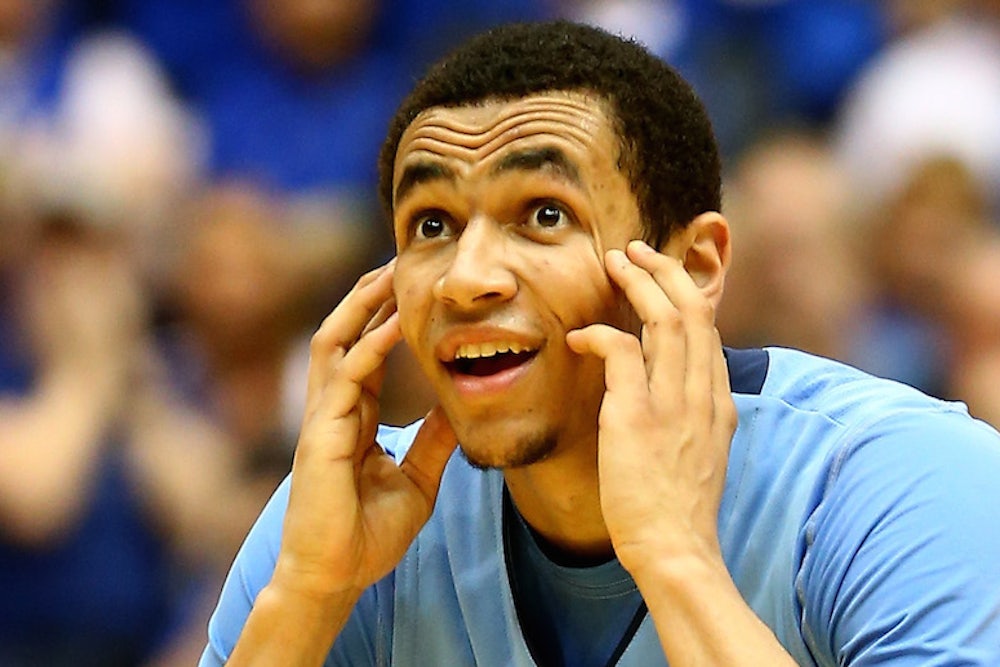Friday night, my seven-year-old son will go the University of North Carolina men’s basketball team’s first exhibition game of the season. He’ll wear his #5 Carolina-blue jersey, in honor of his favorite player Marcus Paige, and he’ll cheer loudly for his second-favorite player, Kennedy Meeks. He’ll get his first glimpse of the three new UNC freshmen hoopsters whose names he’s known since they announced as high school students that they’d be coming to UNC. After five long months of no Tar Heels basketball, he’ll have a great time.
Fortunately, a friend is taking him to the game, and I don’t have to go. I say fortunately because, even though I’m a bigger UNC hoops fan than my son—even though I realize that his fandom almost certainly stems from my own—I know I wouldn’t enjoy myself. While my son will be focusing on Paige and Meeks, I’d be thinking about the bad actors at the heart of the UNC athletic and academic scandal. Although that scandal has been a cloud over UNC sports for the last four years, it didn’t necessarily cloud my enjoyment of Carolina basketball. But on Wednesday, former federal prosecutor Kenneth Wainstein, who was hired by the school to investigate the matter, produced an exhaustive 136-page report that’s impossible to ignore.
Wainstein found that, over the course of 18 years, Deborah Crowder and Julius Nyang’oro—the non-academic administrator and the faculty chairman, respectively, of UNC’s African Studies Department—devised and operated a shadow curriculum, in which some 3,100 students, the majority of them student-athletes, took and received grades and credit for phony classes. Even worse, the academic counselors UNC pays to advise its student-athletes oftentimes funneled their pupils into those phony classes so that they’d be academically eligible to play.
Of all the incriminating emails and documents Wainstein uncovered in his investigation, perhaps his most damning discovery was a PowerPoint slide, produced by the football team’s academic counselors for the coaching staff after Crowder retired in 2009, and the “paper-class” scheme, as it was known, largely came to an end. The slide reads:
We put them in classes that met degree requirements in which:
• They didn’t go to class
• They didn’t take notes, have to stay awake
• They didn’t have to meet with professors
• They didn’t have to pay attention or necessarily engage with the materialAFAM/AFRI SEMINAR COURSES
• 20-25 page papers on course topic• THESE NO LONGER EXIST!
There’s no shortage of college athletics scandals these days. But most of them involve improper benefits to players—which, if you’re a sophisticated fan, you can shrug your shoulders at. After all, considering how much money these athletes make the universities and the television networks and the shoe companies, shouldn’t they get a little something back? But the UNC scandal is something different, since it goes to the very heart of the whole college athletics enterprise. The people who defend the status quo in college sports have always maintained that the student-athletes do get something in return for their on-the-field labors: a free education. Opponents of the status quo, like myself, have often countered that a lot of those student-athletes realistically aren’t able to take advantage of that educational opportunity, because, in playing their sports, they’re essentially working full-time jobs. But I don’t think many of us imagined that the system was as corrupt as it was at UNC—where student-athletes, by being steered into these courses, were basically being defrauded.
The fact that this happened at UNC is especially troubling. First, because, until now, UNC has always had the reputation of being one of the few schools that was able to marry big-time athletics with academic integrity. But it’s also troubling because the only reason we came to know about it is that, despite their best efforts to brush the scandal under the rug, the university’s administration was too inept to execute a proper cover-up. Had they been more expert at this sort of thing—as administrators at other athletic powerhouses surely are—the full extent of this scandal never would have come to light.
I’d imagine that, in a few weeks, when UNC plays its first real game of the season, I’ll be ready to watch and I’ll be there right next to my son at the Dean Dome. I’ll have concocted any number of rationalizations for why I can cheer for UNC in good conscience—from Wainstein’s finding that the basketball team’s academic advisor, unlike the ones for UNC’s football team, apparently sensed something was fishy and eventually started steering players away from the “paper classes”; to the fact that UNC’s current star player, Paige, is an Academic All-American. But the real reason I’ll be cheering is because, at a certain level, I’ll have done what you need to do to be a college sports fan these days: adopt the mentality of a 7-year-old—blissfully unaware of the rot that exists just beyond the field of play.
